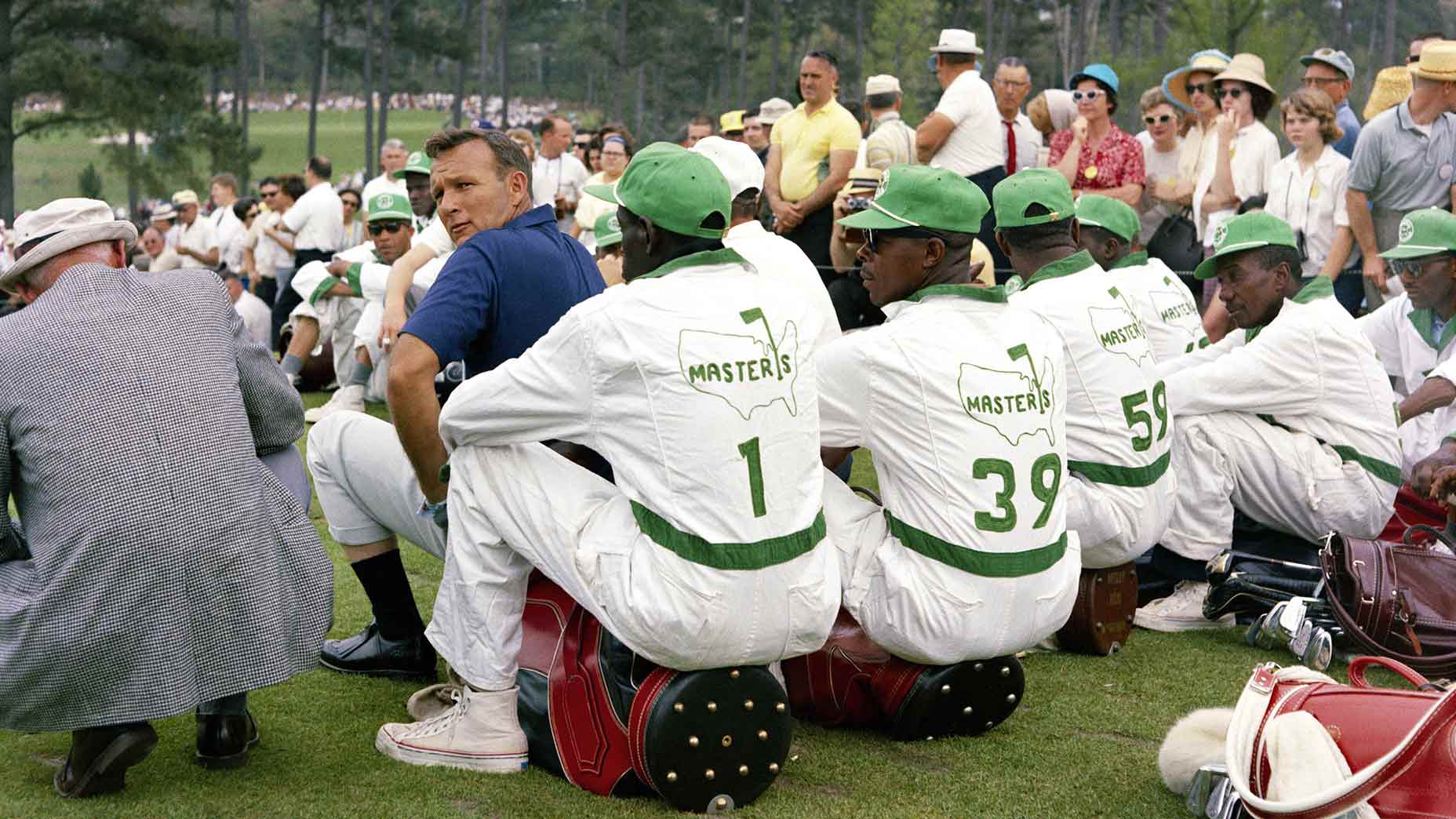With all due respect to Bones and Fluff, they don’t make caddie nicknames like they used to.
Not in the class of Cemetery, Iron Man, Marble Eye, Burnt Biscuits and other vivid monikers that loopers carried at Masters Tournaments of generations past.
The bagmen of Augusta National played a different role than they do today. Every spring, they worked the tournament. By club edict, no other caddies could. The rule, established with the birth of the Masters, in 1934, remained in place for nearly 50 years.
Until November, 1982, when Augusta National chairman Hord Hardin declared by way of press release that the ban on outside caddies had been lifted.
Players could now bring their own to the Masters. In 1983, most did.
The change had arrived gradually, then suddenly.
You could have seen it coming, says Ward Clayton, author of “Men on the Bag: The Caddies of Augusta National.” A broader shift in golf was already underway.
By 1975, both the PGA Championship and the British Open had begun allowing outside caddies, at Firestone Country Club and Carnoustie, respectively. The following year, at the Atlanta Athletic Club, the U.S. Open had done the same.
“Caddying was becoming a more professional job,” Clayton says. “Tour pros had their own guys, and they wanted them with them wherever they went.”
By 1982, the Masters was one of just two tournaments holding fast to a local caddie rule. The other was the Western Open, an event with a long and charitable link to Chicago-area loopers through its connection to the Chick Evans Scholarship Program.
By this time, too, a number of prominent players, including Tom Watson and Lanny Wadkins, had begun urging the green jackets to admit outside caddies for the tournament. It was not in character for Augusta National to bend to external pressure. But the club had been going through internal rumblings since the death of its co-founder, Clifford Roberts, in 1977. Roberts had been bullish about using local caddies. The veteran Augusta National looper Jariah Beard was among those who later contended that the policy change would not have happened with Roberts still in charge.
Beard himself worked 25 Masters, none more memorable than in 1979, when he steered Masters rookie Fuzzy Zoeller to victory. It was the last time a first-timer won the event. Local knowledge mattered, and Zoeller gave credit where it was due. Beard, he said, had guided him through the competition like a seeing-eye dog shepherding a blind man. Beard’s final Masters was in 1982, a watershed year that took some time to show its full effects.
The quickest, hardest consequence was economic. It struck local caddies in their wallets. A seasonal club, Augusta National was their office from October to May. A Masters paycheck helped them fill a gap. Without a tournament gig, many started migrating to other clubs come summer. Some doubled down on year-round second jobs.
The look of the tournament changed, too, as Augusta National’s all-Black caddie corp gave way to a wider, whiter demographic. In 1983, of the 81 players who competed in the Masters, 63 arrived with their own loopers, leaving 18 locals with bags for the week.
Augusta National caddies still work the tournament from time to time, but rarely do they hook up with the top contenders. There hasn’t been a club caddie on the bag of a winner since 1995, when Carl “Skillet” Jackson carried for Ben Crenshaw, repeating a feat the duo pulled off in 1984.
Since 1996, Augusta National’s caddie program has been run by Caddiemaster Inc., a company now owned by Troon Golf. The corporate overlay is a far cry from a bygone freelance workplace filled with characters whose names seemed sprung from fable.
They were real people, of course.
It was an interest in the men behind the monikers that inspired Ward Clayton to write his book, which will be reprinted in an updated version next year by the University of Georgia Press.
Fleshed out in its pages are the lives of such loopers as Nathaniel “Iron Man” Avery, who worked for Arnold Palmer in all four of the King’s Masters wins; Tommy “Burnt Biscuits” Bennett, who scalded his legs as a boy while trying to steal his grandmother’s biscuits; Willie “Cemetery” Perteet, who earned his sobriquet in this fashion: attacked by a knife-wielding ex-girlfriend outside a bar where he’d been gigging with a jazz band, he was brought to the hospital and presumed dead, only to scare the daylights out of morgue attendant by sitting upright on the table.
Perteet is long gone, but his story lives on, too good to let die.
